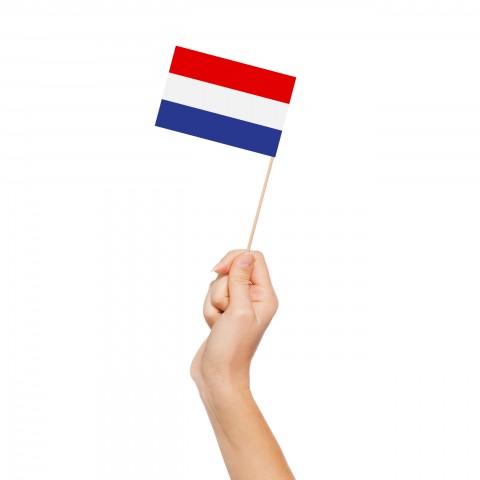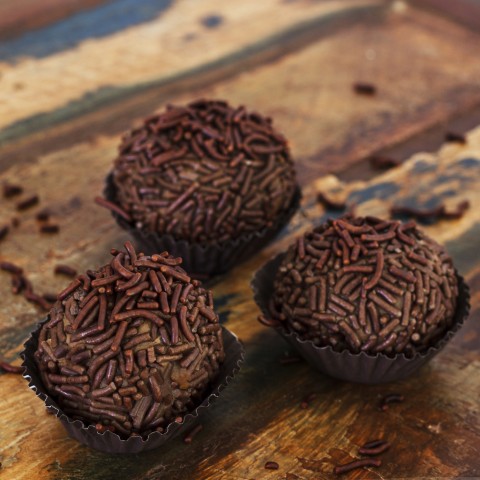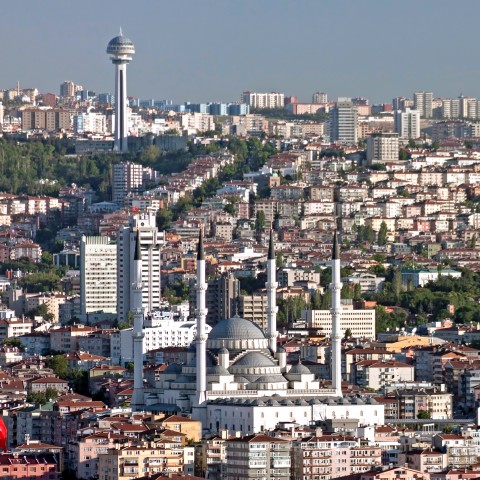
What is the most common question you will hear as a foreigner in the Netherlands? Yes, that oh-so common question about your nationality. As someone living abroad, you will have the advantage of having that as the perfect ice breaker to start some small talk: someone is bound to ask you where you’re from.
This is your time to make a great impression and show your knowledge of the Dutch nationality vocabulary. What would you say about your nationality in Dutch? Saying Ik ben Frans (“I am French”) or Ik kom uit de Verenigde Staten (“I am from the United States”) may not be enough to keep the conversation going.
This is where this guide may come in handy! By learning more vocabulary on nationalities, as well as the related questions and answers, you’ll be ready to impress with the perfect answer (and follow-up question) for the question: “What is your nationality?”, in Dutch.
 Table of Contents
Table of Contents
- Top 20 Nationalities in the Netherlands
- Conversations About Nationalities
- Country, City, Nationality & Language
- How DutchPod101 Can Help You Learn More Dutch
1. Top 20 Nationalities in the Netherlands

Dutch nouns for nationalities are actually quite easy, they are often written quite similar and for the feminine version you just have to add a ´se´. You’ll find as well that some of the countries and their nationalities in Dutch can be similar to their English equivalents. Furthermore, in Dutch nationality names, adjectives and country names are also written with a capital letter, just like in English! Easy, right?
Let’s have a look at a few examples:
| Country’s name | Noun | Adjective |
| Brazilië (“Brazil”) | Braziliaans, Braziliaanse (Brazilian male version, feminine version) | Braziliaanse (Brazilian) |
| Italië (“Italy”) | Italiaans, Italiaanse (Italian male version, feminine version) | Italiaanse (Italian) |
| Mexico (“Mexico”) | Mexicaans, Mexicaanse (Mexican male version, feminine version) | Mexicaanse (Mexican) |
Let’s see some examples of the adjectives:
- Het Braziliaanse eten. (“The Brazilian food.”)
- Het Braziliaanse volkslied. (“The Brazilian anthem.”)
- De Italiaanse vrouwen. (“The Italian women.”)
- De Mexicaanse man. (“The Mexican man.”)
- Zij houdt erg van Mexicaanse muziek. (“She really loves Mexican music.”)

As you can see, in Dutch the country´s name, nationality and adjective all start with an uppercase letter.
So now let’s have a look at how this would look like for the 20th most common nationalities in the Netherlands.
Dutch demography statistics show that in 2020 about 4.22 million of the Dutch citizens are of non-Dutch origin and half of these are from six backgrounds alone: Turks (inc. Kurds), Moroccans (inc. Berbers), Indonesians (inc. Moluccans), Surinamese, Germans and Poles.
Let’s have a look at the numbers from 2019, and learn some useful Dutch words in the process!
| % | English (Country) | Dutch (Country) | Dutch (Adjective) | Dutch (Nationality) |
| 2.37 | Turkey (inc. Kurds) | Turkije | Turks/e | Turk / Turkse |
| 2.33 | Morocco (incl. Berbers) | Marokko | Marokkaans/e | Marokkaan / Marokkaanse |
| 2.08 | Indonesia (incl. Moluccans) | Indonesië | Indonesisch/e | Indonesiër / Indonesische |
| 2.05 | Surinam | Suriname | Surinaams/e | Surinamer / Surinaamse |
| 2.03 | Germany | Duitsland | Duits/e | Duitser / Duitse |
| 1.07 | Poland | Polen | Pools/e | Pool / Poolse |
| 0.9 | Former Netherlands Antilles | Voormalige Nederlandse Antillen | Antilliaans/e | Antilliaan / Antilliaanse |
| 0.69 | Belgium | België | Belgisch/e | Belg / Belgische |
| 0.57 | Syria | Syrië | Syrisch/e | Syriër / Syrische |
| 0.53 | Former Soviet Union | Voormalige Sovjet Unie | – | – |
| 0.53 | Great Britain | Groot-Brittannië | Brits/e | Brit / Britse |
| 0.51 | Former Yugoslavia | Voormalig Joegoslavië | Joegoslavisch/e | Joegoslaaf / Joegoslavische |
| 0.45 | China | China | Chinees/Chinese | Chinees / Chinese |
| 0.36 | Irac | Irak | Irakees/e | Irakees / Irakese |
| 0.33 | Italy | Italië | Italiaans/e | Italiaan / Italiaanse |
| 0.28 | Afghanistan | Afghanistan | Afghaans/e | Afghaan / Afghaanse |
| 0.28 | India | India | Indisch/e | Indiër / Indische |
| 0.27 | France | Frankrijk | Frans/e | Fransman / Franse (or: Française) |
| 0.27 | Spain | Spanje | Spaans/e | Spanjaard / Spaanse |
| 0.26 | United States | Verenigde Staten | Amerikaans/e | Amerikaan / Amerikaanse |
- ➜ Would you like to learn more countries and their nationalities in Dutch? Make sure to stop by our free World Countries and Nationalities vocabulary lists on DutchPod101.
Knowing these countries, it may also come in handy to get to know the names of the different continents in Dutch:
| Europe | Europa | Europees/Europese |
| Asia | Azië | Aziatisch/e |
| Africa | Afrika | Afrikaans/e |
| America | Amerika | Amerikaans/e |
| Oceania | Oceanië | Oceanisch/e |

When you need to be a little more specific, you can use cardinal directions:
| North | Noord |
| South | Zuid |
| East | Oost |
| West | West |
For example:
- Zuid-Amerika (“South America”)
- Oost-Europa (“Eastern Europe”)
- Zuidoost-Azië (“Southeast Asia”)
- Noord-Afrika (“North Africa”)
- ➜ Practice your pronunciation with our useful World Continents & Territories vocabulary list.
2. Conversations About Nationalities
When you meet someone new in a foreign country, you don’t know where the conversation might go. But they will surely ask you where you’re from.
- ➜ Are you applying for Dutch citizenship? Then it might also come in handy to be able to talk about your current nationality. This way you can explain your situation and get that Dutch passport.
When you meet a new person in the Netherlands, they might ask you: Waar kom je vandaan? This literally means “Where do you come from?”, but translates better to “Where are you from?”
If you need to go a bit more formal, you can use U (“You”, formal): Waar komt u vandaan?
To answer, you just say Ik ben, which means “I am,” and then your nationality. So what would you say about your nationality in Dutch?
For example:
- Ik ben Amerikaans. (“I am American.”)
- Ik ben Duits. (“I am German.”)
- Ik ben Braziliaans. (“I am Brazilian.”)
As you can see, in this sentence structure you always take the male version, even if you’re female.
You could also answer with Ik kom uit Duitsland, which means “I come from Germany,”. In that case, in your reply you would have to change the nationality to the name of the country, so “I come from Netherlands.”
For example:
- Ik kom uit Frankrijk. (“I am from France.”)
- Ik kom uit Australië. (“I am from Australia.”)
To return the question you can simply say En jij? This means “And you?”
Last but not least, they could also ask “What is your nationality?”, in Dutch. Saying Wat is jouw nationaliteit? Or asking Ben je [nationality]? (“Are you [nationality]?). So for example, Ben je Fins? (“Are you Finnish?”). To which you could reply:
- Ja, ik ben Fins. (“Yes, I am Finnish.”)
- Ja, ik kom uit Finland. (“Yes, I am from Finland.”)
- Nee, ik ben niet Fins. Ik ben Amerikaans. (“No I am not Finnish. I am American.”)
Or you can use a more advanced reply:
- Ik ben geboren in Finland, maar ik groeide op in Italië. (“I was born in Finland but I grew up in Italy.”)
- Ik ben Fins en Italiaans (“I’m Finnish and Italian.”)
- Ik ben Frans maar ik woon in Finland (“I’m French but I live in Finland.”)
- Ik ben Duits maar ik woon in Japan. (“I’m German but I live in Japan.”)
- Ik ben Braziliaans maar ik woon nu al twee jaar in Frankrijk. (“I’m Brazilian but I’ve been living in France for two years.”)
- ➜ For more ice-breakers and conversation starters, we have a free vocabulary list with the Top 15 questions you should know.
3. Country, City, Nationality & Language
You now know how to talk about countries and their nationalities in Dutch, let’s go back to our list and take it one step further.

| Country in English | Country in Dutch | Major City | Nationality | Language |
| Turkey | Turkije | Ankara | Turk/se | Turks (“Turkish”) |
| Morocco | Marokko | Rabat | Marokkaan/se | Marokkaans (“Moroccan”) |
| Indonesia | Indonesië | Jakarta | Indonesiër/Indonesische | Indonesisch (“Indonesian”) |
| Surinam | Suriname | Paramaribo | Surinamer/Surinaamse | Surinaams (“Surinamese”) |
| Germany | Duitsland | Berlijn (“Berlin”) | Duitser/Duitse | Duits (“German”) |
| Poland | Polen | Warschau | Pool/se | Pools (“Polish”) |
| Belgium | België | Brussel | Belg/Belgische | Nederlands (“Dutch”), Frans (“French”) and Duits (“German”) Belgium has three official languages, however Belgian Dutch, Vlaams (“Flemish”), and Belgian French, Waals (“Walloon”), are mainly spoken there. |
| Syria | Syrië | Damascus | Syriër/Syrische | Arabisch (“Arabic”) |
| Great Britain | Groot-Brittannië | Londen (“London”) | Brit/se | Engels (“English”) |
| China | China | Beijing | Chinees/Chinese | Chinees (“Chinese”) |
| Iraq | Irak | Baghdad | Irakees/Irakese | Iraaks (“Iraqi”) |
| Italy | Italië | Rome | Italiaan/se | Italiaans (“Italian”) |
| Afghanistan | Afghanistan | Kabul | Afghaan/se | Dari |
| India | India | New Delhi | Indiër/Indische | Hindi |
| France | Frankrijk | Parijs (“Paris”) | Fransman/Franse (Française is also used for the feminine version) | Frans (“French”) |
| Spain | Spanje | Madrid | Spanjaard/Spaanse | Spaans (“Spanish”) |
| United States | Verenigde Staten | Washington | Amerikaan/se | Amerikaans (“American”) |
You can combine all of that when you introduce yourself. Here’s what it could look like:
- Ik ben Spaans, ik ben geboren in Madrid maar ik woon nu in Parijs, Frankrijk.
(“I am Spanish, I was born in Madrid but I now live in Paris, France.”) - Ik ben Pools maar ik ben in Spanje opgegroeid.
(“I’m Polish but I grew up in Spain.”) - Ik ben Chinees, maar woon al een tijdje in Brussel.
(“I’m Chinese but I’ve been living in Brussels for some time.”) - Ik ben Indiaas en spreek nog niet zo goed Nederlands. Ik ben zes maanden geleden naar Nederland verhuisd.
(“I’m Indian and I don’t speak Dutch very well yet. I moved to the Netherlands six months ago.”) - Ik ben Turks en Marokkaans. Ik ben opgegroeid in Turkije maar spreek geen woord Marokkaans. (“I’m Turkish and Moroccan. I was raised in Turkey but I don’t speak a word of Moroccan.”)
- Ze is Amerikaanse, spreekt vloeiend Duits en houdt van de Duitse cultuur.
(“She’s American, she speaks German fluently and she loves the German culture.”)
- ➜ Telling where you’re from and what language you speak is a great starting point. To go a bit further, you can check out our vocabulary list with 10 lines to introduce yourself in Dutch.
- ➜ And are you ready to end the conversation and say goodbye? Then use one of these most common ways to say goodbye in Dutch.

4. How DutchPod101 Can Help You Learn More Dutch
In this guide, you have learned everything about countries and their nationalities in Dutch. You also learned some simple as well as complex sentence structures that you can use to answer the popular question Waar kom je vandaan? You even know how to say “What is your nationality?”, in Dutch.
Are there any other nationality related words you would like to learn? Where are you from yourself and what would you say about your nationality in Dutch?
Let’s start putting this Dutch nationality vocabulary in use with the help of DutchPod101’s vocabulary lists with audio recordings, and other free resources to boost your studies.
Would you like some special attention? Remember that we also offer a Premium PLUS service with personal one-on-one coaching: MyTeacher. Let your private teacher help you master this Dutch nationality vocabulary. You’ll receive personalized exercises, constructive feedback, and interactive assignments.
Happy learning on DutchPod101.com!










